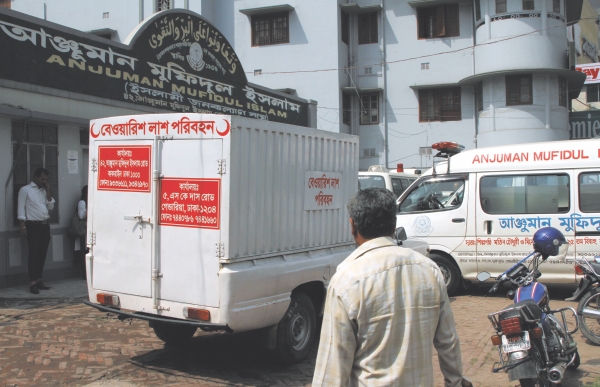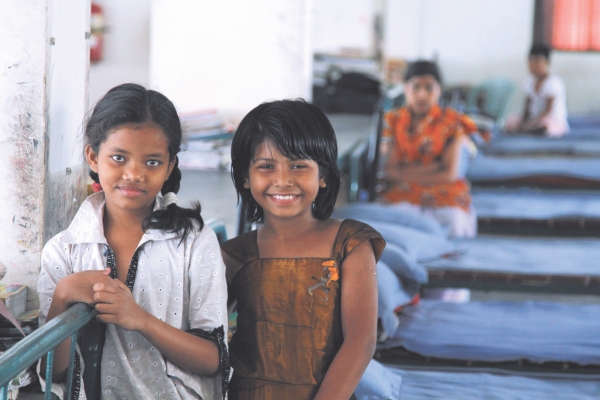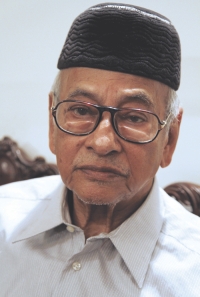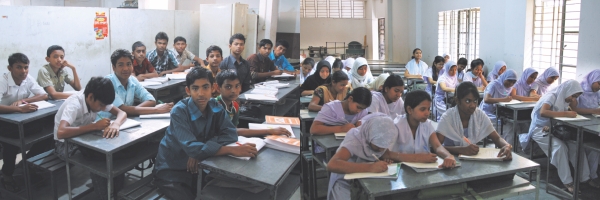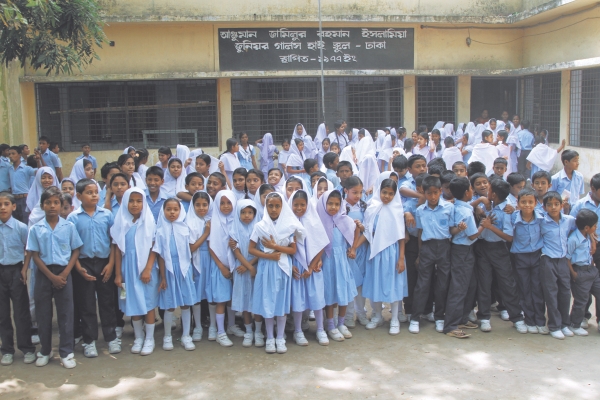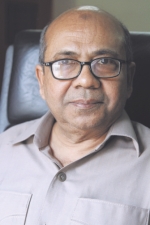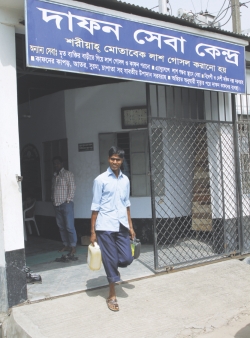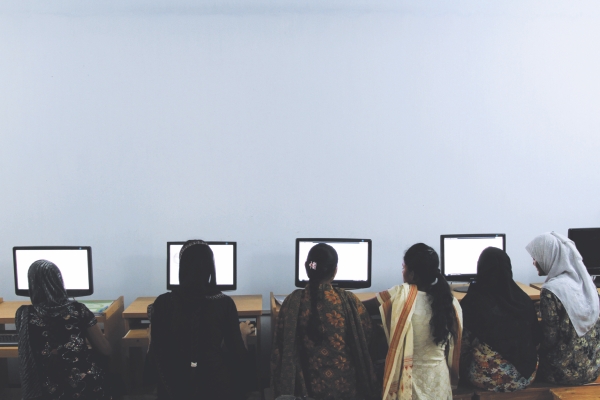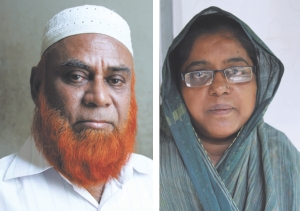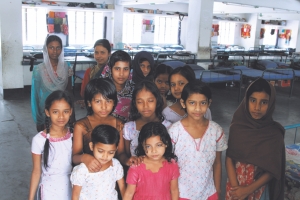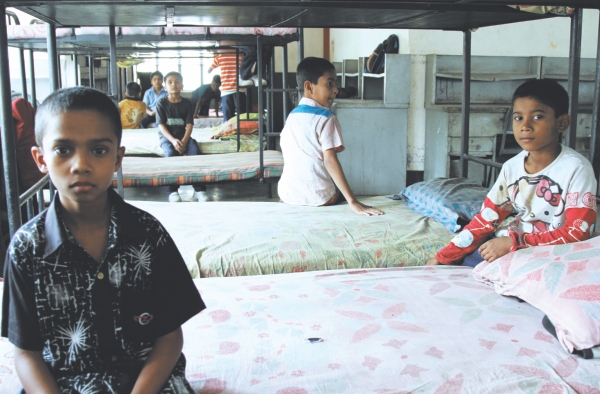| Home - Back Issues - The Team - Contact Us |
 |
| Volume 11 |Issue 13| March 30, 2012 | |
|
|
Cover Story In Life and Death Anika Hossain
In the early 20th century, when India was still under the Colonial rule, there was deep seated trouble between its Hindu and Muslim communities. Riots broke out regularly daily and violence took the lives of many. Dead bodies were strewn all over the streets and many were either claimed by medical facilities or thrown into the nearest rivers. During this time, a man named Sheth Ibrahim Mohammad Dupley who was a resident of the Surat community, took offense to the way his Muslim brothers' bodies were being disposed of. He appealed to the British government for permission to bury them in an Islamic manner. When the permission was granted in 1905, he formed an organisation in Kolkata named Anjuman Mufidul Islam, which buried unclaimed dead bodies of Muslims found in the city. Many well respected members of the community took on the role of President and developed this organisation over the years. In September of 1947, after the partition of India and Pakistan, Anjuman's head office was set up in Dhaka through the help and support of many benevolent members of the society. Now, more than a century later, Anjuman Mufidul Islam, has grown and developed into much more than an organisation providing burial service. It is now one of the largest social welfare institutions in the country, under the leadership of the recently elected chairman, Shamsul Haque Chisti, a former member of the parliament.
“Over the years, we have increased the number of services we provide, not only in Dhaka, but all over the country,” says Kazi Abul Kashem, the Executive Director of Anjuman. “In Anjuman, the most important person is our chairman (president), who is elected by the general members and live (active) members of our organisation. Under him, is the ten-member board of trustees and under them, the managing committee which has fifty five members. The decisions taken by them are carried out by all the live members. The board of trustees looks after our property mostly, and the managing committee which is divided into thirteen groups, is in charge of all our activities.” Burial assistance is still one of the most important services provided by Anjuman. “We receive information about unclaimed dead bodies either from the police, the locals, or from the morgues of Dhaka Medical College Hospital and the Selimullah Medical College Hospital,” says Kashem, “The good news is that the number of unclaimed bodies has decreased over the years. Four or five years earlier, we buried about 2000 dead bodies approximately, but over the past year we buried a few over 1000.” Drivers and carriers employed by the organisation collect these bodies and they are cleaned and buried either in the Dhaka Jurain graveyard or the Azimpur graveyard. Once the bodies are buried, Anjuman takes on the responsibility of the safekeeping of the graves so that the bodies are not stolen or buried over. For the financially well off, Anjuman has a service called the Daphon Sheba Project. The rich come to Anjuman to have their dead washed and ready for burial. Arrangements are made for a Janaza before the body is transported to their homes or graveyards, whichever they prefer. Another important service provided by Anjuman is their ambulance service. “We currently have twenty four ambulances,” says Kashem, “We also have two freezing vans and three pickup trucks. For the air-conditioned ambulances that travel within Dhaka, we charge TK 600, if they travel outside Dhaka, the clients have to pay the toll, gas, petrol or ferry costs needed to get them there. We make no profit from this service, in fact, it is provided for free for the underprivileged population,” he says.
"When I first joined Anjuman Mufidul Islam, it had only one orphanage,” says A.B.M.G Kibria, former Inspector General of Police, a former ambassador and advisor to the President of Bangladesh, and the recently retired chairman of Anjuman after eighteen long years of dedicated service. “When I went to visit the orphanage, in 1991, I found three children and a monkey under a tin shed. We now have a six-storied building for boys and a four-storied building for girls. Female children were not welcome at the time, but I convinced the members that they were more at a disadvantage than the male children. Look how far we've come now.” As a part of its efforts to expand, Anjuman has set up three orphanages, two in Gandaria and one in Narayanganj, which house over 300 children. These orphanages are different from the ones usually seen in the city. Open and airy, these have small playgrounds for the children, complete with slides and swings. Each child has their own comfortable bed and a study table. There is a game room complete with a carom board, table tennis equipment, board games and a library with all kinds of books. There are even separate sick rooms for children feeling under the weather. Best of all, there is a smile on every little face in these homes. Raju, Shakil and Munir who are residents at the boy's orphanage eagerly look forward to their evening's games after a tiring day at school. “We get to play on the school playground every evening and on Fridays, we are taken to the local sports field. We are also taken out on picnics. We went to Fantasy Kingdom this year and they let us go on the rides for free!” smiles Raju. The kitchens in the facilities are spotless and delicious smells waft through the halls as beef, eggs and vegetables are cooked for the children's meals. “The diet for the children is approved by the Dhaka University Nutrition Department,” says Md Abdul Halim, the Assistant Director of Anjuman, “They also get food from our donors fairly often and this includes rich food like biriyani or teheri which they love.” Nusrat Jahan, who is the supervisor of the girl's orphanage in Gandaria has her hands full with 139 little ones. “I try and keep them busy by teaching them household chores like cooking and cleaning,” says Jahan. “In the evenings they have a home tutor for their school subjects and an Arabic tutor who teaches them to read the Quran. They also watch a little TV everyday. They are all so naughty and restless-- it's sometimes hard to manage them, but they are like my family,” she says.
The orphanages run by Anjuman not only house children who have lost either one or both parents, they also take in children whose guardians are living in poverty and cannot support them. “The orphans come to us through reference,” says executive director, Kazi Abul Kashem. “Two of our managing committees are solely dedicated to the care of our orphan boys and girls and they select the children who come to us. The primary applications are collected by these committees who make sure all the necessary documents are submitted, proving that the children are either orphans or underprivileged.” These applications are then given to a sub-committee, members of which will call in the applicants for interviews to determine their eligibility. “We also have provisions for on-the-spot verification of the statements made by the applicants. Once they are enrolled, we bear all their expenses, including board, lodging, clothing, education, health/medical care and all their needs and necessities,” comments Kashem. In order to provide these orphans and other underprivileged children all over the country with a proper education, Anjuman runs several educational institutes. “We have two junior high schools, one in Gandaria and the other in Nayatola,” says Kazi Abul Kashem. “One of our schools is called Anjuman Jamilur Rahman Islamia Junior Girl's High School and the other Anjuman Raihana Mahbub Junior High School. We also have two technical institutes, where our students are enrolled after they graduate from junior high. This is where they start their SSC vocational course.”
Tahmina Khatoon joined the Anjuman Jamilur Islamia Junior High School in 1995 and is very pleased with the way the school is being run, “I grew up in this area, hearing about Anjuman, but I didn't realise how much they do until I joined here as headmistress,” says Tahmina. “We get hundreds of applications for admission every year but we have one class and one section to fill. We took about 42 students this year. The orphans of course, are given priority and everyone else has to take an entrance exam to enroll. Anjuman bears all expenses, books, pens and uniforms for all students from nursery to class 8. Our students are doing very well; in fact one student from class five has received the Joynul Abedin Padak for two consecutive years now.” According to Tahmina, the teachers undergo training twice yearly and must hold a Masters Degree to get a job at this school. The children are taken on yearly study tours and field trips which are entirely financed by Anjuman.
“I am extremely proud of our computer lab,” says Mirza Abdul Hye, headmaster of the Technical Institute. “We are teaching students how to use the internet and Microsoft office. They all want to be computer engineers when they grow up!”
For those who do well in their SSC exams, Anjuman finances their higher education. “Many of our students have graduated and have found decent jobs,” shares Kashem. “After their SSC, most of our orphans go back to their guardians. Since they have completed their vocational courses, some get into the electrical trade, some get into dress making, air-condition repairs etc in order to support themselves. Others become engineers and architects.” While these are some of the most important programmes run by Anjuman, they are not by any means the only ones. During Ramadan, the organisation distributes clothes bought with Zakat money, amongst the underprivileged. “This is not an easy task,” says Kashem. “We have a Zakat and Daan Shongroho committee (collection committee) that buys all the clothes and we distribute them through our managing committee, all over Dhaka.” They also distribute warm clothes and blankets to the poor and destitute all over the country in the winter time. These are sometimes donated by individuals or institutions, and sometimes, bought with Anjuman's own funds. “We have 43 district branches, through which we distribute these. In Dhaka, we have a relief committee that does this job for us,” says Kashem. Anjuman also has a medical committee, which sets up a yearly camp during the Biswa Ijtema. This year about 9000 Muslims were treated at this camp. “We give out free medicines and quite a few doctors work here round the clock,” says Kashem. The medical committee also runs the Sunnat-e- Khatna programme, for children whose parents cannot afford to have them circumcised in a medically safe manner. “We set up five or six camps a year in slums all over the city, says Kashem. “They are given the necessary injections about a month before the circumcision. After the procedure, we give the children lungis and nutritious food so they don't face any health problems afterwards.” Anjuman also has a medical centre in Kakrail where underprivileged people are treated free of cost. “We give out medication to the poor through this centre and we have a part time doctor here four days a week,” informs Kashem.
Another important committee run by Anjuman is the Media Publication Branch Affairs Committee, which looks after all the branches and coordinates between them. “Our branches collect applications from the underprivileged people of their district, requesting financial assistance, and sends them to the head office,” says Kashem. “We do have funding restrictions but we verify these and select the neediest applicants.” If the selected applicants are women, Anjuman buys them sewing machines and gives them TK 2000 as working capital. For men, they send money to buy a cow, rickshaw or perhaps a push cart. The money is distributed by the district branches all over the country. One committee of vital importance under Anjuman is the one that overlooks the collection of, hides of Qurbani (sacrificial) animals, each year during Eid. “We set up camps all over Dhaka and we collect these from streets and transport them by our rickshaws, push carts, trucks etc. We make 30 to 40 lakhs every year by selling these,” says Kashem. One of Anjuman's interesting ventures includes assisting freedom fighters who are suffering financially. “We give them Tk 1000 every month, provided we can verify their claim of being a muktijodha,” says Kashem. Alongside this, they give underprivileged individuals (old, sick, or disabled men and women) about Tk 500 every month. “Each of our managing committee members can recommend one person to receive this money,” says Kashem. These numerous noble ventures must be financed somehow. For this purpose, Anjuman has two types of funding, a general fund, and a zakat fund. “This year, from zakat donations we made Tk 3, 14, 20, 967,” says Kashem. “From our general donations we made Tk 3, 50, 53,000. As for fund raising, people either come to our office themselves to donate, or they call us and we send someone to collect the money. Our members also collect zakat from their friends and relatives for us. Same procedure applies for the general fund.”
Anjuman also has a trust fund scheme. For a minimum of 3 lakh takas, one can open a trust fund with them, from which a portion of the yearly interest will be added to the principal amount, and the rest will be used in any way the donor sees fit for the organisation. “We currently have 43 trust funds, which add up to 2 crores,” says Kashem. “We also get sadgas, fitras etc, both in cash and also in other forms. For example, people may donate a sheep as sadga to the orphanage and we'll feed it to the children. Many people do their Qurbani in the orphanage and we make arrangements for that.” On Shab-e-Barat, Anjuman sets up camps of sorts all over the city. Throughout the entire night, they collect donations. Members of Anjuman participate in each camp. “Last year, we made 8 lakh takas in one night. This amount increases each year,” says Kashem. Bangladeshis who live abroad also want to donate to Anjuman when they come to visit their homeland. “We have very limited publicity, and yet people hear about us from other people, learn more from our website and come to us,” Kashem comments. Jamiunnessa Tunu, who lives in London, expressed an interest in donating to Anjuman when she visited Dhaka. At first, she gave them money to buy a new ambulance which cost about 20 lakh takas. She then showed interest in establishing a trust fund with them. Pleased with the work they were doing at their schools and orphanages, she gave them 25 lakhs for the fund. She still calls Anjuman from time to time to find out about the children and pays them to mail her their quarterly publication, the Anjuman Barta. Many people send them money which they get as gifts on their birthdays, anniversaries etc. “One man bought us an ambulance on his anniversary,” Kashem smiles. While Anjuman runs a number of successful ventures at present, they have even bigger, more ambitious plans for the future. In a few short years, they plan to build an old peoples' home in Savar. They have some land in Savar that was donated to them, and have used part of this land to construct a tin roofed building where they plan to house about 20 members of the elderly community and take care of all their expenses. They also want to build an 18 storied building in Kakrail, where they were donated some land in the 70's. They plan to use a part of this building for their offices and ambulance parking space and rent out the rest to commercial companies. “We have already made an agreement with the Institute of Architecture about this,” says Kashem. “They will organise a design competition and the design that wins will be submitted to Rajuk. We hope to start this year.” Another future plan involves some land that they bought from the government, in Mugdapara. “We already have a service centre there which has two ambulances for the use of the local people,” shares Kashem, “We also want to build a Polytechnic Institute there for our current students and for poor students all over the country. We will make living arrangements for the students there. We have submitted a plan for this at Rajuk already and hope we can get started next year,” says an optimistic Kashem.
Many members of the downtrodden and neglected community residing in our country, place their faith in Anjuman's benevolence. “I will never forget an incident that took place one Shab-e- Barat,” recalls former chairman of Anjuman, A B M G Kibria, “A group of beggars pooled together the money they made that night and donated it to Anjuman. When we asked them why they were parting with their limited income, they said they are giving it to the one place they know, that will take care of them when they needed help, even after they pass away. Everytime I remember this, it strengthens my faith in the work we are doing.” A common misconception people have about Anjuman is that they only cater to the Muslim community. “We will look after anyone who needs our help,” says Kibria. “For example, if we find a dead body of a Hindu person, we will find an organisation which will cremate the body for us. The problem is, people from other religions assume we will only help Muslims and don't come to us for assistance.” Upon learning about Anjuman and observing its endeavours, many well known and respected people (political figures, businessmen, philanthropists etc) of our society have become active members. To become a member, one must submit an application to the administrative committee of Anjuman. If this is accepted, one must pay Tk 15,000 in order to join. Anjuman Mufidul Islam welcomes members who will be active participants in the running, management and fund raising ventures of the organisation. “I have worked in many different NGO's, but I have never felt the satisfaction and peace that I feel from working at Anjuman,” says assistant director Md Abdul Halim. “Here, they really help, they use every penny donated to assist the needy. It is truly one of its kind.”
|
||||||||||||||||||||||||
Copyright
(R) thedailystar.net 2012 |
|||||||||||||||||||||||||
